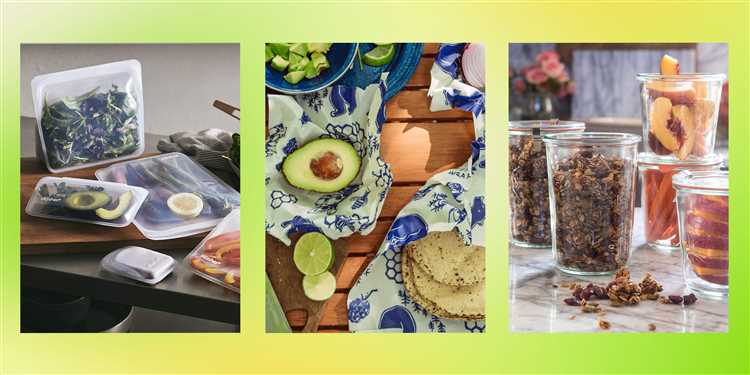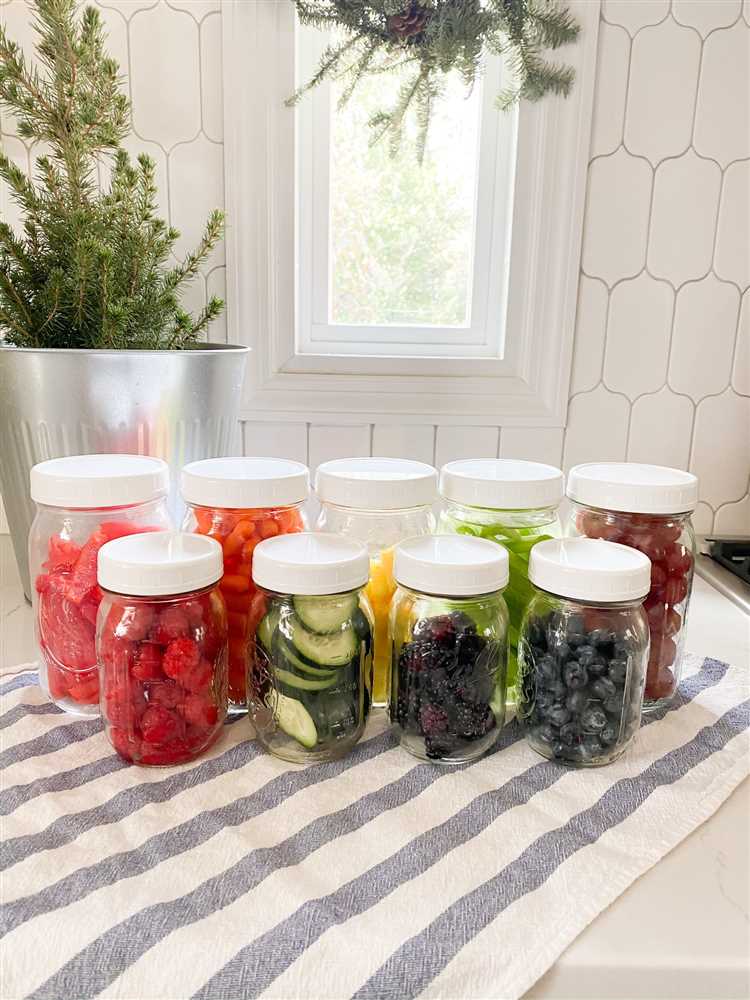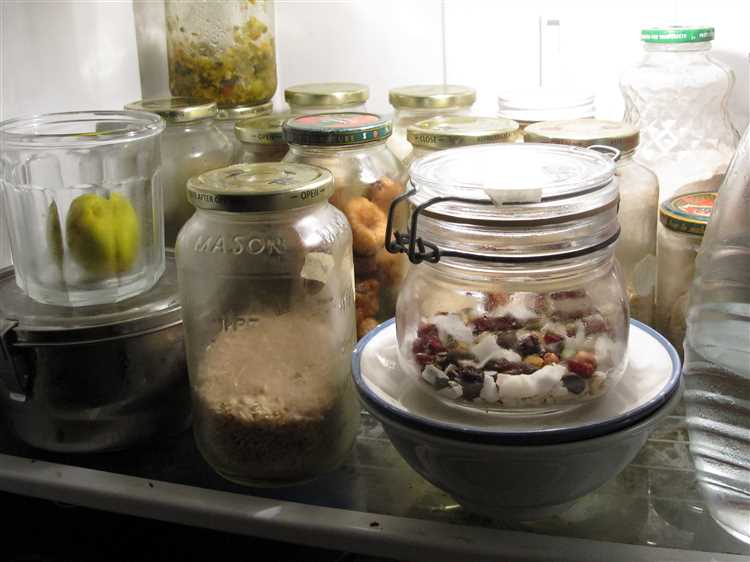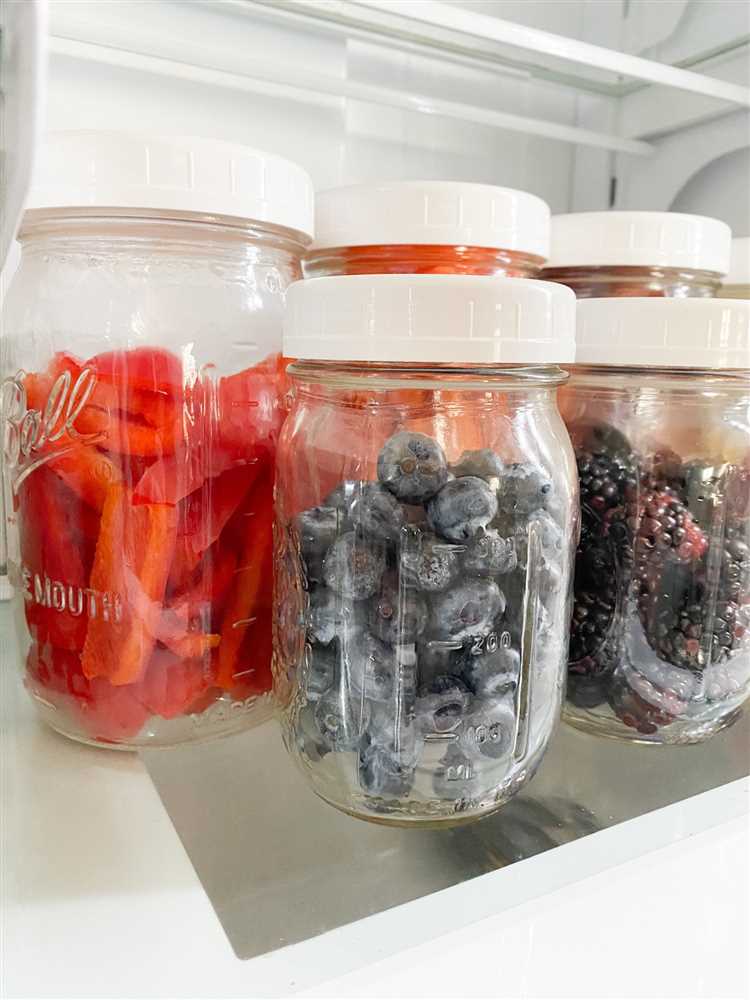
Storing fruit properly is essential to maintain its freshness and extend its shelf life. One of the key factors in fruit storage is choosing the right container. While there are various options available, glass and plastic containers are among the most popular choices.
Glass containers have long been favored for their durability and ability to preserve the flavor and quality of fruits. The non-porous surface of glass prevents odors and flavors from being absorbed, ensuring that the fruit retains its natural taste and aroma. Additionally, glass is a safer alternative to plastic, as it doesn’t leach harmful chemicals into the fruit. However, glass containers are heavier and more fragile, making them less convenient for transportation and prone to breakage.
On the other hand, plastic containers are lightweight and more convenient for on-the-go storage. They are also less likely to break if accidentally dropped. However, there are concerns about the potential health risks associated with plastic containers. Some types of plastic can release chemicals, such as BPA, into the fruit, which may have adverse effects on human health. Furthermore, plastic containers may not provide the same level of insulation as glass, leading to quicker spoilage of the fruit.
In conclusion, while both glass and plastic containers have their advantages and disadvantages, glass containers are generally considered the best way to store fruit. They provide a safer and more effective means of preserving the freshness and flavor of the fruit. However, if portability and convenience are a top priority, plastic containers may be a suitable alternative for short-term storage. Ultimately, the choice between glass and plastic containers depends on individual preferences and needs.
- Choosing the Right Containers for Storing Fruit
- Glass Containers: Preserving Freshness and Flavor
- The Benefits of Glass
- Airtight Seal
- Environmentally Friendly
- Plastic Containers: Convenient and Durable Option
- 1. Lightweight and Portable
- 2. Versatile and Stackable
- 3. Transparent and BPA-Free
- 4. Easy to Clean and Maintain
- 5. Cost-Effective
- Considerations for Storing Different Types of Fruit
- Key Factors When Selecting Fruit Storage Containers
- Tips for Properly Storing Fruit in Glass or Plastic Containers
- Q&A,
- Can I store cut fruits in glass containers?
- Is it better to store fruits in plastic containers for a longer duration?
- What are the benefits of storing fruits in glass containers?
- Can I use plastic containers to store fruits in the refrigerator?
Choosing the Right Containers for Storing Fruit

When it comes to storing fruit, choosing the right containers is essential for maintaining freshness and maximizing shelf life. Glass and plastic containers both have their benefits and drawbacks, so it’s important to consider your specific needs and preferences.
Glass containers are a popular choice for storing fruit because they are non-porous and do not absorb odors, flavors, or stains. This means that they won’t affect the taste or quality of your fruit. Glass is also transparent, allowing you to easily see the contents of the container without opening it. Additionally, glass containers are reusable, durable, and environmentally friendly.
However, glass containers can be heavy and prone to breaking if mishandled or dropped. They can also take up more storage space than plastic containers, especially if you have a large amount of fruit to store. Glass containers may not be suitable for those who are looking for a lightweight and portable option.
Plastic containers, on the other hand, are lightweight, durable, and easy to transport. They are also available in a variety of shapes and sizes, making it easier to find containers that fit your specific needs. Plastic containers are generally more affordable than glass containers and are less likely to break if accidentally dropped.
However, plastic containers may scratch, break, or warp over time, especially if exposed to high temperatures or harsh cleaning agents. They may also absorb odors and flavors from the fruit, which can affect the taste and quality. Some plastics also contain chemicals that may leach into the fruit and pose health risks.
Ultimately, the best choice for storing fruit depends on your personal preferences and priorities. If you prioritize durability and eco-friendliness, glass containers may be the better option. However, if you need lightweight and portable containers that are easy to transport, plastic containers may be more suitable.
Regardless of the type of container you choose, it’s important to properly clean and dry them before storing your fruit to prevent the growth of bacteria or mold. It’s also advisable to check the containers for any cracks or damage before use to ensure that they provide a safe and suitable environment for your fruit.
Glass Containers: Preserving Freshness and Flavor
Glass containers have long been known for their ability to preserve the freshness and flavor of fruit. When it comes to storing fruit, glass containers offer several advantages over plastic containers.
The Benefits of Glass
Glass is nonporous, meaning it does not absorb any odors or flavors from the fruit. This ensures that the fruit retains its natural taste and aroma. Plastic containers, on the other hand, can sometimes absorb odors from other foods, which can affect the taste of the fruit.
Glass containers are also transparent, allowing you to easily see the contents without having to open the container. This is particularly useful when trying to identify ripe fruit or when planning meals.
Airtight Seal
Glass containers typically come with airtight lids, creating a sealed environment that helps to maintain the fruit’s freshness. The airtight seal also prevents any outside air from entering the container, which can contribute to spoilage.
The seal of a glass container is usually made of rubber or silicone, which provides an effective barrier against air and moisture. This helps to prevent the fruit from drying out or becoming mushy.
Furthermore, the airtight seal helps to keep fruit safe from pests that may be attracted to the sweet smell of ripening fruit.
Environmentally Friendly

Glass containers are a more sustainable option compared to plastic containers. Glass is made from natural materials, such as sand, and is 100% recyclable. This means that glass containers can be reused or recycled, reducing their impact on the environment.
Plastic containers, on the other hand, are made from fossil fuels and can take hundreds of years to decompose. They also contribute to plastic pollution, which is a major environmental concern.
By choosing glass containers to store fruit, you are making a more eco-friendly choice that helps to reduce waste and minimize harm to the planet.
In conclusion, glass containers are an excellent choice for storing fruit due to their ability to preserve freshness and flavor. They provide a nonporous and transparent storage option, an airtight seal, and are environmentally friendly. So, next time you want to store fruits, consider using glass containers to ensure your fruit stays fresh and delicious.
Plastic Containers: Convenient and Durable Option
When it comes to storing fruit, plastic containers can be a great option. They offer convenience and durability, making them a popular choice for many households. Here are some reasons why plastic containers are a convenient and durable option for fruit storage:
1. Lightweight and Portable
Plastic containers are lightweight, making them easy to carry and transport. This is especially beneficial if you plan on taking fruit with you on the go, such as for picnics or school lunches. Unlike glass containers, plastic is less likely to break or shatter during transportation, reducing the risk of accidents.
2. Versatile and Stackable
Plastic containers come in a variety of sizes and shapes, offering versatility in fruit storage. They can be found in different capacities to accommodate various quantities of fruit, allowing you to choose the right size for your needs. Additionally, plastic containers are stackable, which helps save space in your refrigerator or pantry.
3. Transparent and BPA-Free

Many plastic containers are transparent, allowing you to easily see the contents inside without the need to open them. This can be helpful when quickly identifying the type of fruit or checking its freshness. Furthermore, many plastic containers are now BPA-free, which ensures that harmful chemicals are not leaching into your fruit.
4. Easy to Clean and Maintain
Cleaning plastic containers is a breeze. They can be washed with soap and water or conveniently placed in the dishwasher. Plastic is also less likely to stain or absorb odors compared to glass. This makes plastic containers a low-maintenance choice for fruit storage.
5. Cost-Effective
Plastic containers are generally more affordable than glass containers, making them a budget-friendly option. If you have a large quantity of fruit to store, using plastic containers can be a cost-effective solution.
While there are some concerns regarding the environmental impact of plastic, many plastic containers are now recyclable. Be sure to check the recycling codes on the bottom of the container and dispose of them properly to reduce waste.
In conclusion, plastic containers provide convenience and durability for fruit storage. Their lightweight nature, versatility, and easy maintenance make them a practical choice for many consumers. Consider the specific needs of your fruit storage and choose plastic containers as a convenient and durable option.
Considerations for Storing Different Types of Fruit
When it comes to storing fruit, different types of fruit have different storage needs. Here are some considerations to keep in mind:
Berries: Berries are delicate fruits that can easily become bruised or moldy. They should be stored in shallow containers to prevent crushing and in a single layer to allow for good air circulation. Plastic containers with lids can work well for berries as they provide a barrier against moisture.
Apples and Pears: Apples and pears can be stored together but should be kept away from other types of fruit as they release ethylene gas, which can cause other fruits to ripen faster. Both apples and pears prefer a cool, dark place, such as the crisper drawer of a refrigerator. Glass containers can be suitable for storing apples and pears, but make sure the containers have airtight lids to prevent air exposure.
Citrus Fruits: Citrus fruits like oranges and lemons have a longer shelf life and can be stored at room temperature. However, they will last even longer if stored in a cool place, such as the refrigerator. Plastic containers with lids can be a convenient option for storing citrus fruits, as they help retain moisture and prevent drying out.
Stone Fruits: Stone fruits, such as peaches, plums, and cherries, should be stored at room temperature until they are fully ripe. Once ripe, they can be refrigerated to extend their shelf life. It is best to store stone fruits in a single layer to prevent bruising. Glass containers with airtight lids can be a good choice for storing stone fruits as they can help maintain the fruit’s freshness.
Bananas: Bananas should be stored at room temperature and away from other fruits, as they release a high amount of ethylene gas, which can cause other fruits to ripen and spoil faster. Storing bananas in a plastic bag or container can help contain the gas and prolong their shelf life.
Remember that proper fruit storage also depends on the ripeness of the fruit. Some fruits, like bananas and stone fruits, should be stored at room temperature until they are fully ripe, while others, like berries and citrus fruits, are best kept in the refrigerator. By considering the specific needs of different types of fruit, you can ensure that they stay fresh and delicious for longer.
Key Factors When Selecting Fruit Storage Containers
When it comes to storing fruit, choosing the right container is essential to preserving its freshness and taste. There are several key factors to consider when selecting fruit storage containers:
1. Material: The material of the container is an important factor to consider. Glass and plastic are the two most common options. Glass containers are non-porous, which means they won’t absorb odors or flavors from the fruit. Plastic containers, on the other hand, are lightweight and less likely to break if accidentally dropped.
2. Transparency: Opting for transparent containers is beneficial for fruit storage. Being able to see the fruit without opening the container allows you to assess its condition and freshness. This can help you avoid any unpleasant surprises when it comes time to eat the fruit.
3. Air circulation: Adequate air circulation is crucial for maintaining the freshness of the fruit. Look for containers with small ventilation holes or vents that allow air to circulate. This will help prevent the fruit from becoming mushy or spoiling too quickly.
4. Size: Consider the size of the container in relation to the amount of fruit you plan to store. It’s important to have enough space for the fruit to be stored without overcrowding, as this can lead to bruising or damage to the fruit.
5. Sealability: Airtight containers are ideal for keeping fruit fresh for longer periods. Containers with secure lids or sealing mechanisms help keep out moisture, which can cause the fruit to spoil. Additionally, if the container is not airtight, it may not be able to prevent the fruit’s aroma from spreading to other foods in the vicinity.
6. Durability: Consider the durability of the container. Glass containers are generally more durable and long-lasting compared to plastic containers. However, plastic containers may be a better option if you frequently transport or travel with your fruit.
By taking these key factors into account, you can select the most suitable fruit storage containers for your needs. Whether you choose glass or plastic containers, ensuring that they meet these criteria will help extend the shelf life of your fruit and maintain its quality.
Tips for Properly Storing Fruit in Glass or Plastic Containers
Properly storing fruit is essential for maintaining its freshness and flavor. Whether you choose to store your fruit in glass or plastic containers, following these tips will help you keep your fruit in optimal condition:
- Choose ripe fruit: Before storing your fruit, make sure it is fully ripe. Unripe fruit should be kept at room temperature until it ripens.
- Wash before storing: It is important to wash your fruit before storing it to remove any dirt or residue. However, make sure to dry it thoroughly before placing it in a container.
- Use airtight containers: Regardless of whether you prefer glass or plastic containers, ensure that they have a tight seal to prevent air from entering. This will help slow down the ripening process and maintain the fruit’s freshness.
- Consider the container material: Glass containers are non-reactive, meaning they won’t absorb odors or flavors from the fruit. Plastic containers, on the other hand, may retain odor and can be more prone to scratching.
- Avoid overcrowding: Overcrowding can lead to bruising and squashing of fruits. Make sure to leave enough space in the container for the fruit to breathe and prevent damage.
- Keep in the refrigerator: Most fruits benefit from being stored in the refrigerator. However, some fruits, such as bananas, should be kept at room temperature as refrigeration can cause them to turn brown and lose their flavor.
- Separate ethylene producers: Certain fruits, such as apples and bananas, produce ethylene gas, which can speed up the ripening process of other fruits. To prevent premature ripening, store these fruits separately from others.
- Check regularly: Even with proper storage, fruit can still spoil. Check your containers regularly and remove any spoiled fruit to prevent it from spoiling the rest.
By following these tips, you can prolong the shelf life of your fruit and ensure that it tastes fresh and delicious when you are ready to enjoy it.
Q&A,
Can I store cut fruits in glass containers?
Yes, you can store cut fruits in glass containers. Glass containers are a great option for storing cut fruits as they do not react with the fruits and can keep them fresh for a longer period of time.
Is it better to store fruits in plastic containers for a longer duration?
No, it is not recommended to store fruits in plastic containers for a longer duration. Plastic containers can sometimes react with fruits and cause them to spoil faster. It is always best to use glass containers for storing fruits for a longer duration.
What are the benefits of storing fruits in glass containers?
Storing fruits in glass containers has several benefits. Glass containers do not react with fruits, thus keeping them fresh and preventing any chemical reactions. Glass also helps to maintain the temperature and moisture level, which helps to prolong the freshness of the fruits. Additionally, glass containers are eco-friendly and can be recycled.
Can I use plastic containers to store fruits in the refrigerator?
Yes, you can use plastic containers to store fruits in the refrigerator. However, it is important to choose BPA-free plastic containers to avoid any potential chemical reactions with the fruits. Glass containers are still a better option as they do not react with the fruits and can help to keep them fresh for a longer period of time.